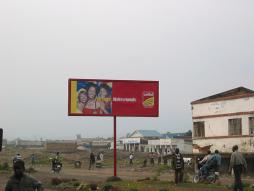A new study from the University of Manchester argues that conflict is benefitial to mobile infrastructure investments. These investments have long thought to be dependent on 'pillars' like security and stability, finance and infrastructure, workers and labour markets, and the regulatory framework and tax. "Overarching all of these, the view is that good, stable governance forms the crucial basis for investment," write Agnieszka Konkel and Richard Heeks from the University of Manchester in the UK.
But is this really the case? Konkel and Heeks have co-authored a new report that questions this long-held view. Entitled "Challenging Conventional Views on Mobile Telecommunications Investment: Evidence from Conflict Zones." It investigates mobile telecommunications in three insecure states that score poorly in the World Governance Index: Afghanistan, the Cnogo, and Somalia.
Heeks note that while "data is limited [it] suggests that insecurity and "bad governance" may not
be the barriers to investment that are normally supposed. Indeed, it is possible – at least for this type of digital technology – that they may encourage investment."
Professor Heeks told MobileActive.org in an email interview: "[Our motivation was] first the feeling that conflict zones have been somewhat ignored in the ICT4D field despite their importance in the world. And then, when we looked at those zones, we found the unexpected outcome that mobile telephony seemed to be thriving for what then turned out to be partly despite and partly because-of reasons related to the conflict."
Afghanistan, the Congo, and Somalia - three "investment basket cases" -- are among the most insecure, violent, and unstable countries on earth but yet saw significant mobile investment. The countries were outperforming average annual mobile penetration growth rates in most other countries. Growth rates in the three countries studied from 2001-2006 were 111%, compared to an average of 52% across Africa and just 28% in Asia.
"Of course, high growth rates could be put down to the very low baseline figures, and also the absence of mainline telephony alternatives," concedes the study.
Yet, Heeks told MobileActive.org: "Clearly investors have been attracted through the obstacles because of demand. And bad governance and insecurity are so interwoven that information must surely have a premium in badly-governed regions. Looking at the pictures from those areas of Georgia this week where governance has broken down, what do we see -- people in and out of uniform all on their mobiles." Heeks concedes that there is "a lot of evidence" for the positive role played by government in the development and diffusion of ICTs.
"So we have a conundrum in trying to explain why badly-governed states still manage high levels of mobile telecom investment. We should probably just leave it at that for now until we get more on-the-ground evidence," he said.
Is this peculiar to mobiles? Heeks says he still doesn't know the answer.
"In terms of ICTs, our article suggests there might also be an effect for mainline phones -- the high growth rates of mainlines in Somalia are particularly intriguing. There might be a similar effect for Internet investment but it's hard to tell -- the 2001 figures are so low that any sort of increase looks amazing in percentage terms," Heeks notes.
"For other types of investment, your guess is as good as mine -- of course there will be aid-funded investments like roads and other infrastructure but the interesting point about ICTs is that they appear to have included a lot of private investment," he notes.
While growth rates have been astounding, the paper also has a cautionary note: "Mobile telecommunications has become the silver bullet du jour of international development. And, beyond the hype and alongside some exacerbation of inequities, it can be seen delivering both social and economic development outcomes. Yet at least half the world's population lack access to this development tool."
Photo: "Share Our World." Democratic Republic of Congo. Courtesy: rguerra. (Thank you, Robert!)


Post new comment